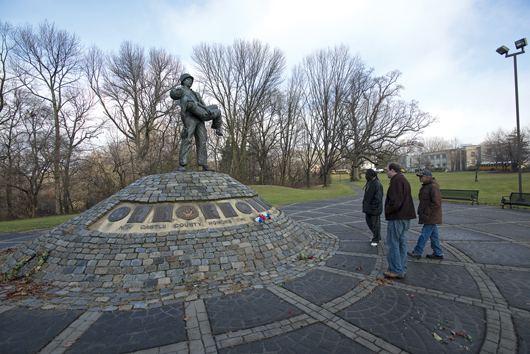Despite hardship veterans soldier on

RESEARCH | For Benjamin Fleury-Steiner, research for his new book, Disposable Heroes:The Betrayal of African American Veterans, was uncomfortable and disquieting.
An associate professor of sociology, he spent months interviewing black veterans of Vietnam, Iraq and Afghanistan in the back streets of Wilmington, Del., to learn more about their service to their country and their experiences upon returning home. The book was published last fall by Rowman and Littlefield.

The topic had long been on the mind of Fleury-Steiner, himself an Army veteran of Operation Desert Storm who had ducked Scud missiles in Saudi Arabia. Educated and able to take full advantage of his GI Bill benefits, he says images of homeless veterans—people who had made the sacrifice to go to war for their country and who returned to extreme poverty and neglect—haunted him and drove him to undertake research for the book.
What he found were soldiers marching on in the face of homelessness, addiction, failing health and unemployment.
“Disposable Heroes,” he writes, “begins with a simple observation: For a grossly disproportionate number of African American soldiers, the end of military service signals a return to a largely unforgiving civilian world that has little use for them.”
Fleury-Steiner began his work with interviews at Independence House in Wilmington, which provides temporary housing for men. The project later grew, taking him into impoverished neighborhoods in the city and to Baltimore, where he gained access through a chapter of the National Association of Black Veterans.
In all, he captured and shares with the reader the stories of 30 veterans. Some had been drafted, some enlisted, but all found racial oppression at home and in the service.
The stories of Vietnam veterans are particularly instructive, he says, as young men left segregated working-class neighborhoods during the upheaval of the civil rights movement, witnessed Jim Crow laws and traditions at training facilities in the South and, in at least one case, returned to find Wilmington under siege with National Guard troops patrolling the streets in the wake of the assassination of the Rev. Dr. Martin Luther King Jr.
Following the trauma of war, Fleury-Steiner says, there was the secondary trauma of knowing that “the military in which you served has occupied your neighborhood.”
In the last chapter of the book, “We Thank You for Your Service,” Fleury-Steiner points out that such encouragement expressed to veterans is empty without providing them the tools they need to successfully reintegrate into the civilian world.
And yet, the soldiers interviewed for the book are proud survivors.
“Despite everything they’ve been through, they absolutely do not want to see themselves as victims,” Fleury-Steiner says. “They are resilient, and that resilience is incredible to me. They keep driving on no matter what.”
Article by Neil Thomas, AS76






